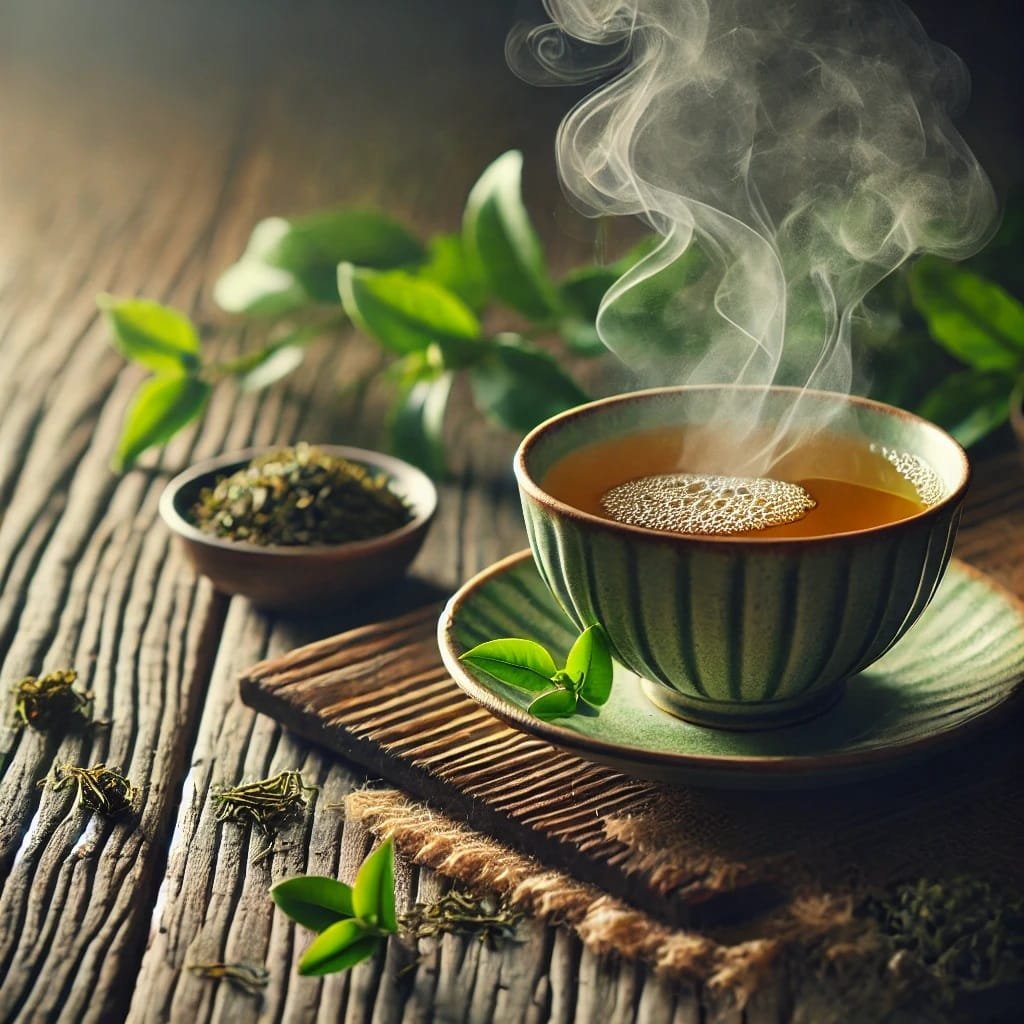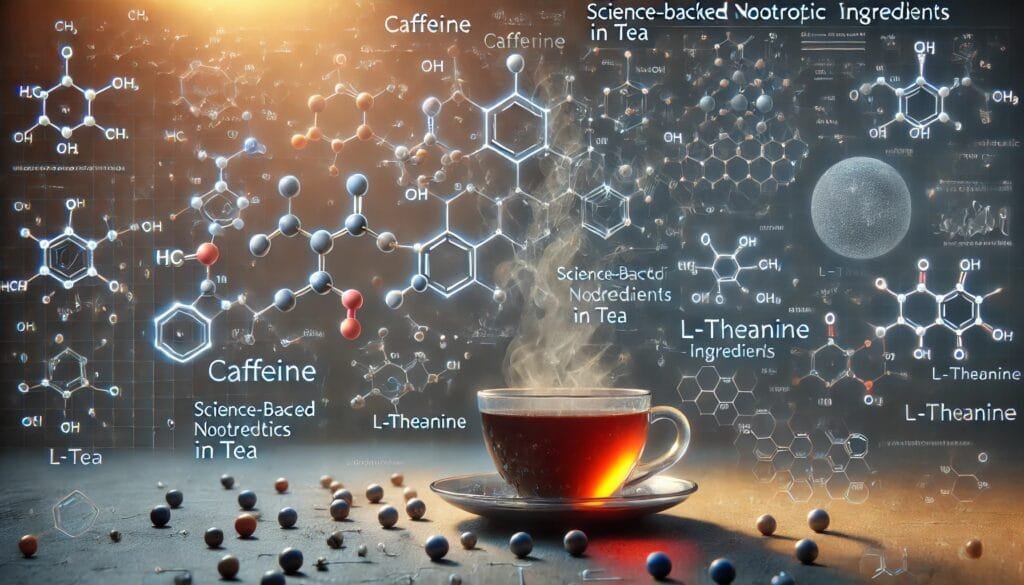Unlock the secrets to enhanced mental clarity with our expert guide on brewing techniques and DIY tea recipes for focus. Learn the science behind tea compounds like caffeine and L-theanine, follow step-by-step brewing instructions, and explore unique recipes designed to boost your cognitive function. Whether you’re a busy professional, student, or tea enthusiast, this guide will help you craft the perfect cup of focus-enhancing tea every time.
Introduction to Cognitive Tea Brewing
In today’s fast-paced world, staying focused is more challenging than ever. Many of us rely on coffee for a quick pick-me-up, but tea offers a gentler, balanced alternative that not only stimulates the mind but also promotes relaxation. Brewing the perfect cup of tea is more than a ritual—it’s a science. Mastering your tea brewing techniques can unlock the full potential of natural compounds, transforming your daily tea into a potent tool for enhanced mental clarity.
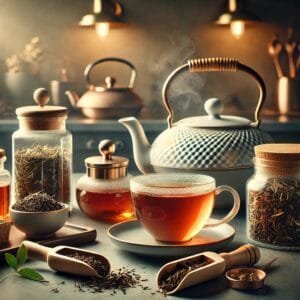
Why Brewing Techniques Matter for Cognitive Function
The effectiveness of tea in boosting cognitive function relies on more than just the tea leaves. Critical factors such as water temperature, steeping time, and tea-to-water ratio all affect how well the beneficial compounds are extracted. By understanding and optimizing these variables, you can maximize the extraction of caffeine, L-theanine, and polyphenols—key ingredients that work together to improve focus and reduce mental fatigue. 1 2
The Science Behind the Brew
Tea is a complex drink containing several bioactive compounds. Two of the most important for cognitive enhancement are caffeine and L-theanine.
How Temperature, Time, and Water Quality Affect Extraction
- Caffeine Extraction:
Caffeine extraction from tea is significantly influenced by brewing conditions, particularly temperature and time. Research indicates that caffeine is rapidly extracted within the first few minutes of brewing, and slight changes in water temperature can notably affect the caffeine content. 3 - L-Theanine Extraction:
L-theanine is a unique amino acid found in tea, contributing to its umami taste and offering various health benefits. The extraction of L-theanine from tea is influenced by several factors, including temperature, time, and the type of tea used. Most L-theanine is extracted within the first few minutes of brewing, making precise timing crucial for maximizing its content in tea.4 - Water Quality:
Using filtered or spring water is essential. Minerals and chemicals found in tap water can alter both the flavor and extraction efficiency, potentially diminishing the cognitive benefits of your brew.- Flavor and Sensory Quality: Tea brewed with purified or spring water generally has better sensory quality compared to tea brewed with tap or mineral water. Tap water, with its higher mineral content, can lead to a less desirable taste and darker color in tea infusions.5 6 7
- Chemical Composition and Antioxidant Capacity: The type of water used significantly affects the chemical composition of tea. Purified and spring water enhance the extraction of catechins and caffeine, which are crucial for the antioxidant properties of tea. Tap water, with higher pH and total dissolved solids (TDS), reduces the concentration of these beneficial compounds.5 7
- Catechin and EGCG Content: Green tea, in particular, benefits from being brewed with purified or deionized water, which can double the content of Epigallocatechin Gallate (EGCG), a key catechin with health benefits. This is less pronounced in black tea but still relevant.6
- Stability and Oxidation: High pH and mineral content in tap water can lead to rapid oxidation of catechins, especially in green tea, resulting in a darker color and reduced antioxidant capacity.7
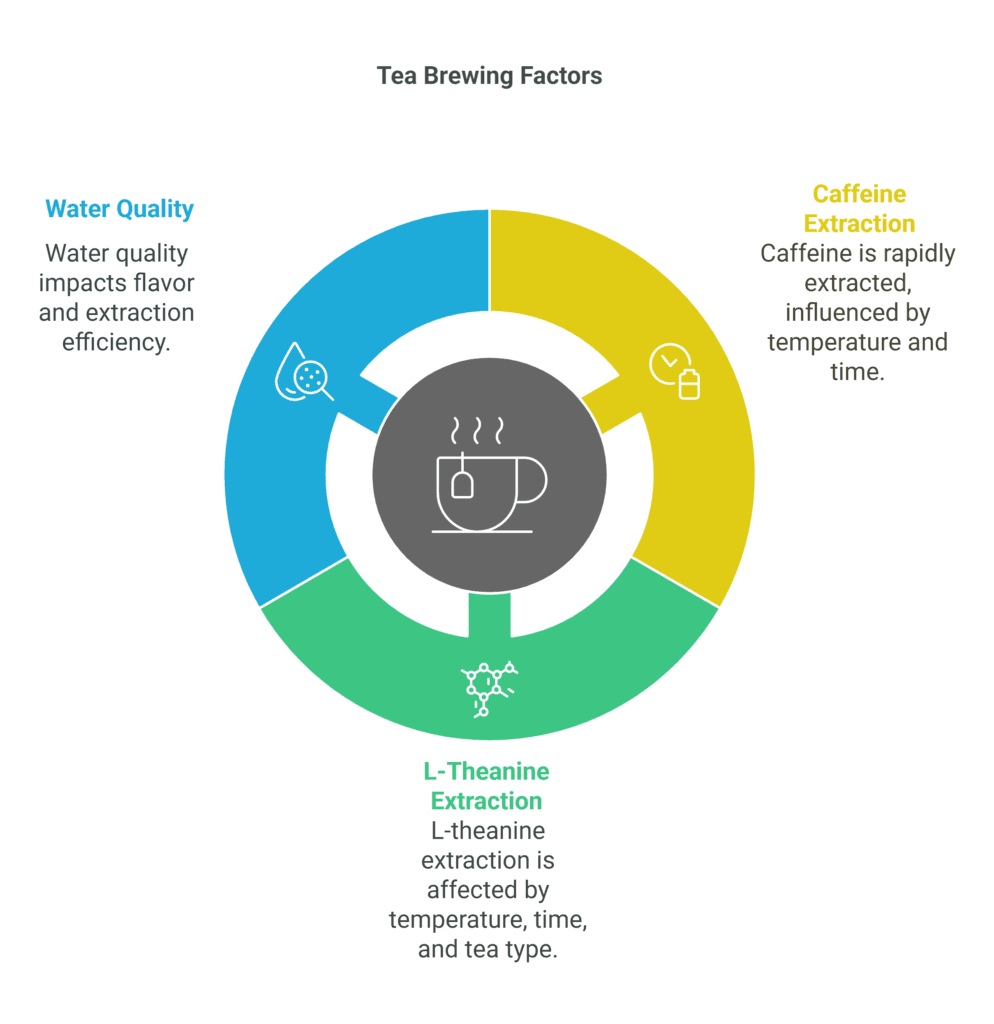
The Synergy of Caffeine and L-Theanine
When combined, caffeine and L-theanine create a synergistic effect. Caffeine boosts alertness, while L-theanine promotes relaxation by increasing alpha wave activity in the brain. This unique blend offers a state of calm focus, which is particularly beneficial for tasks requiring sustained mental effort. Studies have demonstrated that this combination can improve attention and reaction time while reducing the side effects typically associated with caffeine alone.8 9 10 11
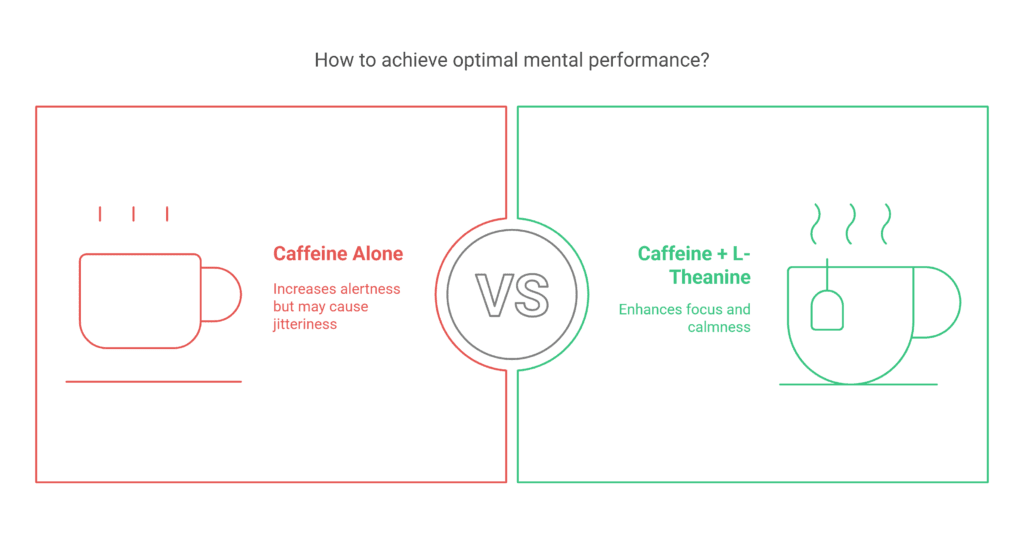
Step-by-Step Brewing Techniques
Perfecting your tea brewing process is essential for maximizing cognitive benefits. Below is a comprehensive guide detailing each step, along with tips to ensure a flawless cup every time.
Essential Equipment and Ingredients
- Tea Leaves:
Choose high-quality loose-leaf teas (e.g., green tea, matcha, or oolong) for the best flavor and benefits. - Teapot or Infuser:
Use a ceramic or glass teapot for even heat distribution, or a stainless steel infuser for convenience. - Kettle:
A kettle with temperature control is ideal to achieve the precise water temperature. - Filtered Water:
Always use filtered or spring water to avoid unwanted minerals that might affect taste.
Detailed Brewing Process
- Measure the Tea:
Use approximately one teaspoon of loose-leaf tea per 8-ounce cup. Consistent measurements ensure uniform extraction. - Heat the Water:
- Green tea: Heat water to 175°F (80°C)
- Oolong tea: Heat water to 185°F (85°C)
- Black tea: Heat water to 200°F (93°C)
- Pre-warm the Teapot:
Pour a small amount of hot water into the teapot to warm it up, then discard. This prevents temperature loss during brewing. - Add Tea Leaves:
Place the measured tea into the teapot or infuser. - Pour Water:
Gently pour the heated water over the tea leaves, ensuring even coverage. - Steep:
Allow the tea to steep—2-3 minutes for green tea, 3-5 minutes for oolong, and 4-5 minutes for black tea. Precise timing ensures optimal flavor extraction. - Strain and Serve:
Remove the tea leaves and pour the tea into your cup. Enjoy your perfectly brewed beverage!
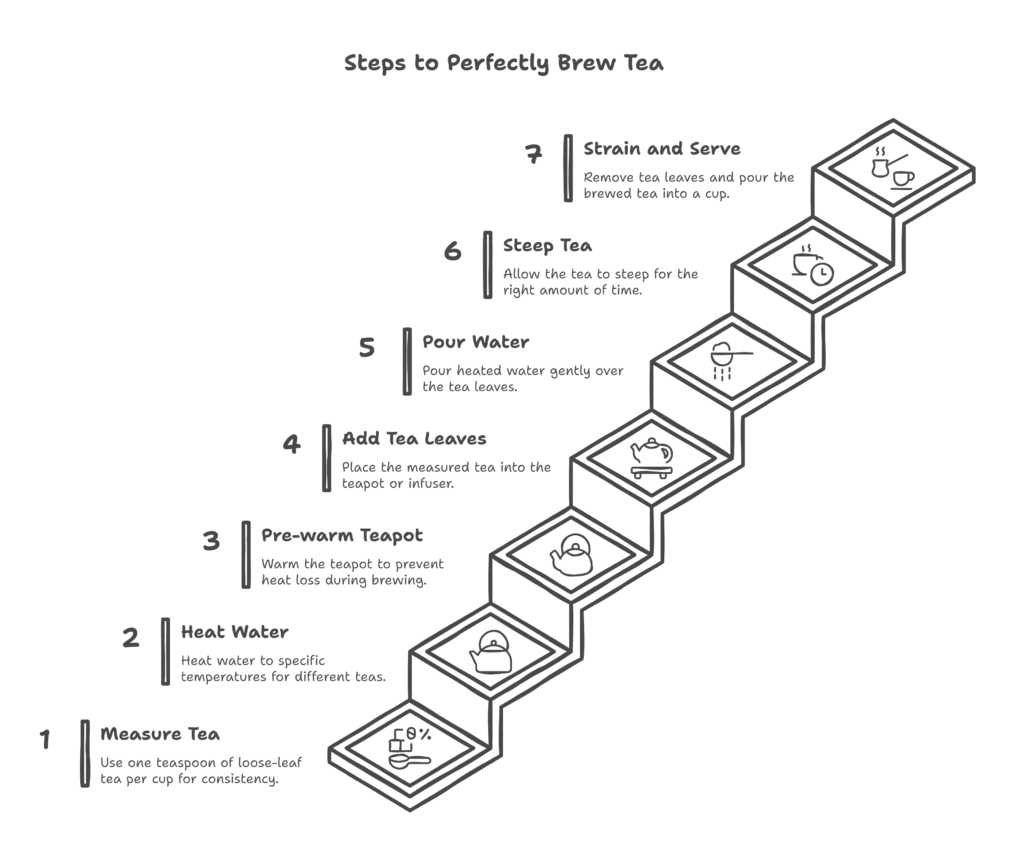
Tips:
- Avoid Over-Steeping: Over-steeping can lead to excessive tannin release, resulting in a bitter taste.
- Experiment: Adjust steeping times and temperatures according to your taste. Use a timer to help maintain consistency.
DIY Tea Recipes for Focus
Personalizing your tea blends can enhance both flavor and cognitive benefits. Here are three carefully crafted recipes designed to boost focus and mental clarity.
Recipe 1: Classic Green Tea Boost
Ingredients:
- 1 teaspoon of high-quality green tea leaves
- A few fresh peppermint leaves
- A slice of fresh ginger
Instructions:
- Combine green tea, peppermint, and ginger in your teapot.
- Heat water to 175°F (80°C) and pour over the ingredients.
- Steep for 2-3 minutes.
- Strain and serve.
Benefits:
Green tea provides a balanced dose of caffeine and L-theanine, peppermint enhances mental clarity, and ginger improves circulation.
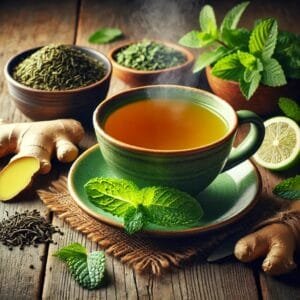
Recipe 2: Matcha Meditation Blend
Ingredients:
- 1 teaspoon of matcha powder
- 1/2 teaspoon of ashwagandha powder
- 1/2 teaspoon of cinnamon
- 1 cup of almond milk (or milk of choice)
Instructions:
- Warm the almond milk (do not boil).
- In a bowl, whisk matcha, ashwagandha, and cinnamon together.
- Gradually add the warm almond milk while whisking until frothy.
- Pour into a cup and enjoy.
Benefits:
Matcha delivers a concentrated burst of L-theanine and caffeine, while ashwagandha supports stress reduction and cinnamon offers a warming flavor along with blood sugar regulation benefits.
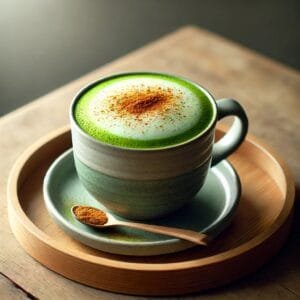
Recipe 3: Yerba Mate Energy Elixir
Ingredients:
- 1 tablespoon of yerba mate leaves
- A few fresh lemon balm leaves
- A slice of fresh ginger
- Honey or lemon to taste
Instructions:
- Place yerba mate, lemon balm, and ginger in an infuser or teapot.
- Heat water to 200°F (93°C) and pour over the mixture.
- Steep for 4-5 minutes.
- Strain the brew and add honey or lemon as desired.
Benefits:
Yerba mate contains natural caffeine to boost energy, lemon balm helps reduce anxiety, and ginger aids digestion, creating a refreshing elixir for improved focus.
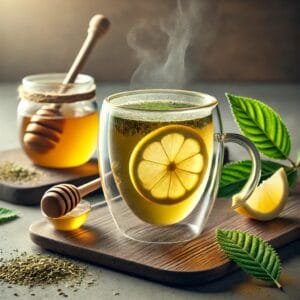
Tips, Tricks & Troubleshooting
Even experienced tea brewers face occasional challenges. Below are common issues and practical solutions to ensure your brew is always perfect.
Common Mistakes and How to Fix Them
- Over-Steeping:
Leaving tea leaves in water for too long can lead to bitterness due to excessive tannin extraction. Use a timer to follow the recommended steeping durations. - Incorrect Water Temperature:
Water that is too hot or too cold can negatively impact flavor and compound extraction. Use a kettle with temperature control or a reliable thermometer. - Poor-Quality Water:
Tap water may contain minerals or chemicals that alter taste. For the best results, use filtered or spring water.
Frequently Asked Questions
Wrapping Up
Mastering the art of brewing cognitive teas is both a science and a personal journey. By understanding the crucial variables—such as water temperature, steeping time, and tea quality—you can transform a simple cup into a powerful tool for mental clarity and focus.
Next Steps:
- Experiment with Brewing Techniques:
Start with a variety of high-quality teas and practice different brewing methods. Keep a brewing journal to note the effects of different variables on flavor and focus. - Create Your Own Blends:
Use the provided DIY recipes as a foundation and experiment with additional herbs and spices to tailor your blend to your taste and needs. - Integrate Tea into Your Routine:
Make tea brewing a mindful ritual. If you are looking for deeper insights into cognitive teas, check out The Ultimate Guide to Cognitive Teas. - Share Your Experience:
We invite you to join our community. Share your brewing tips and recipes in the comments or on our social media channels.
Ready to boost your brain health naturally?
Subscribe to our newsletter for updates on new blog posts, news, reviews, and guides.
Join Our Newsletter
Receive updates on new blog posts, news, reviews, and guides
Additional Resources and Final Thoughts
For those who wish to dive deeper:
- Explore More: Read our comprehensive Comparative Review of Cognitive Teas vs. Traditional Teas.
- Internal Links: Visit our posts on the Ultimate Guide to Cognitive Teas and Science-Backed Nootropic Ingredients in Tea for further insights.
In a world where every sip matters, choosing the right tea isn’t just about flavor—it’s about enhancing your overall well-being. Whether you lean towards the innovative edge of cognitive teas or the enduring tradition of classic teas, your perfect cup awaits. Cheers to a brighter, more focused you!
Disclaimer: This article is for informational purposes only and does not substitute professional medical advice. Always consult a healthcare provider for any health concerns.
Sources:
- Mancini, E., Beglinger, C., Drewe, J., Zanchi, D., Lang, U., & Borgwardt, S. (2017). Green tea effects on cognition, mood and human brain function: A systematic review.. Phytomedicine : international journal of phytotherapy and phytopharmacology, 34, 26-37 . https://doi.org/10.1016/j.phymed.2017.07.008.
- Dietz, C., & Dekker, M. (2017). Effect of Green Tea Phytochemicals on Mood and Cognition.. Current pharmaceutical design, 23 19, 2876-2905 . https://doi.org/10.2174/1381612823666170105151800.
- Ziaedini, A., Jafari, A., & Zakeri, A. (2010). Extraction of Antioxidants and Caffeine from Green Tea (Camelia sinensis) Leaves: Kinetics and Modeling. Food Science and Technology International, 16, 505 – 510. https://doi.org/10.1177/1082013210367567.
- Keenan, E., Finnie, M., Jones, P., Rogers, P., & Priestley, C. (2011). How much theanine in a cup of tea? Effects of tea type and method of preparation. Food Chemistry, 125, 588-594. https://doi.org/10.1016/J.FOODCHEM.2010.08.071.
- Xu, Y., Zou, C., Gao, Y., Chen, J., Wang, F., Chen, G., & Yin, J. (2017). Effect of the type of brewing water on the chemical composition, sensory quality and antioxidant capacity of Chinese teas.. Food chemistry, 236, 142-151 . https://doi.org/10.1016/j.foodchem.2016.11.110.
- Franks, M., Lawrence, P., Abbaspourrad, A., & Dando, R. (2019). The Influence of Water Composition on Flavor and Nutrient Extraction in Green and Black Tea. Nutrients, 11. https://doi.org/10.3390/nu11010080.
- Cao, Q., Wang, F., Wang, J., Chen, J., Yin, J., Li, L., Meng, F., Cheng, Y., & Xu, Y. (2021). Effects of brewing water on the sensory attributes and physicochemical properties of tea infusions.. Food chemistry, 364, 130235 . https://doi.org/10.1016/j.foodchem.2021.130235.
- Kahathuduwa, C., Dassanayake, T., Amarakoon, A., & Weerasinghe, V. (2017). Acute effects of theanine, caffeine and theanine–caffeine combination on attention. Nutritional Neuroscience, 20, 369 – 377. https://doi.org/10.1080/1028415X.2016.1144845.
- Haskell, C., Kennedy, D., Milne, A., Wesnes, K., & Scholey, A. (2008). The effects of l-theanine, caffeine and their combination on cognition and mood. Biological Psychology, 77, 113-122. https://doi.org/10.1016/j.biopsycho.2007.09.008.
- Giesbrecht, T., Rycroft, J., Rowson, M., & Bruin, E. (2010). The combination of L-theanine and caffeine improves cognitive performance and increases subjective alertness. Nutritional Neuroscience, 13, 283 – 290. https://doi.org/10.1179/147683010X12611460764840.
- Owen, G., Parnell, H., De Bruin, E., & Rycroft, J. (2008). The combined effects of L-theanine and caffeine on cognitive performance and mood. Nutritional Neuroscience, 11, 193 – 198. https://doi.org/10.1179/147683008X301513.


